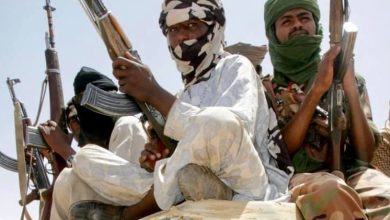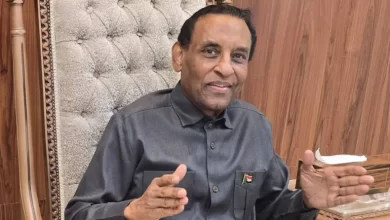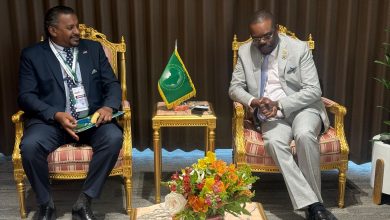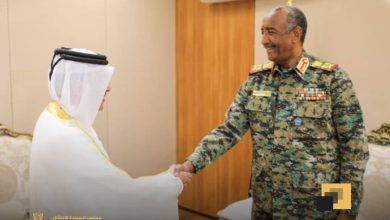“Taqaddum”… Obstacles of Birth and Rift

Sudan Events – Abdul Basset Idriss
A few months after its formation, the Democratic Civil Forces Coordination “Taqaddum” failed to convince others, more effective in the political arena, to join it. This is parallel to the inability of the coalition to open any channel of communication with the army, after the refusal of the President of the Sovereignty Council and Commander-in-Chief of the Army, Lieutenant General Abdul Fattah Al-Burhan. They met abroad, but the coalition continued to cling to the hope that some Western powers would support it in its presence in the political scene during the period after the war stopped.
Divergence and disagreements
The new establishment of the Taqaddum Coordination is based on some components of the “FFC” Forces of Freedom and Change Alliance, which formed an objective alternative to post-revolution authority and change of the political system. It is no secret the differences that erupted before and during the government of the resigned Prime Minister, Abdullah Hamdouk, and the Communist Party’s early departure from the alliance, then The National Umma Party froze its activities, followed by other parties and civil society organizations, until the end of the alliance of a small group of parties considered the basic element for the formation of Taqaddum currently, which includes the National Umma Party – the wing of the General Secretariat – and the Popular Movement for Democratic Revolutionary Change led by Arman, which originally split from the Popular Movement and led by Malik. Agar and the divided Unionist Assembly led by Babiker Faisal and the Sudanese Congress Party.
Taqaddum was unable to conduct a self-criticism to review the mistakes that accompanied the transitional period, which distanced it from the masses of the forces of revolution and change, as people followed through processions and chanting demonstrations against the FFC leaders.
After a few months, a wave of divisions and disagreements prevailed within Taqaddum as a result of the intense competition between its factions for control and leadership.
Informed sources told (Sudan Events) that major differences surfaced during coordination meetings held in Cairo, after the Vice-President of the National Umma Party, Dr. Maryam Al-Sadiq requested the head of coordination, Dr. Abdullah Hamdouk, to carry out reforms and restructure the new alliance, hinting at the departure of the National Umma Party if these reforms are not completed, especially a commitment to remain neutral towards the ongoing war between the army and the Rapid Support Forces (RSF) rebels.
The same dispute spread more widely to Paris through the conference called for by France, a group of Taqaddum and some political figures and symbols. The political official of the Eastern Sudan Alliance, a signatory to the East Path Peace Agreement, Khaled Shawish, criticized specific parties for standing behind Paris’ call for the conference.
Shawish said in a press release that the “Mazraa Group” group was the one that took charge of the invitations and deliberately excluded others from attending the conference.
Even within the conference, confrontations occurred between the general supervisor of the Masalit, the leaders of the national forces, and the prominent politician, Amjad Farid, on the one hand, and the leaders of Taqaddum on the other hand. The disputes took place after violent criticism directed by the first party of the Taqaddum group, which was about the legitimacy of who it represents and whether this presence actually represents the Sudanese, in addition to supporting it. Leaders provide the Sari militia with support in its war against the army and the Sudanese people and do not condemn the horrific violations committed by the rebels against defenseless citizens.
The conference did not succeed in issuing a unanimous final statement.
Attempt and reluctance:
The leaders of Taqaddum realize that the coalition cannot achieve any additional point without working to add others, especially after the army rejected a request submitted by the head of the new coalition, Dr. Abdullah Hamdouk, to meet with the army commander, Lieutenant General Al-Burhan, but he responded to that request from one of the military sites, He said that he would not meet with Taqaddum and its leaders abroad, asking Hamdouk and his group to come to talk from inside the country with the Sudanese people and the displaced victims of the militia and those displaced from their homes. Al-Burhan later said that everyone who betrayed the people and worked against the state will not have any political future, stressing that he will not talk until after the battle is over.
It seems that these conversations have disturbed the leaders of Taqaddum and worked to spoil their pivotal plan represented by their leaders joining the Jeddah negotiations, through what the leaders of Taqaddum call linking the path of stopping the war to the political process and returning to democratic civilian rule.
Political analyst Ibrahim Osman told (Sudan Events) that Taqaddum leaders are trying to put pressure on the army using two paths: the first is external, relying on Western and regional pressure to convince the army of the idea of accepting their participation as civilian forces in any negotiations between the army and RSF, and the second path is through expanding the alliance by including other groups. Ibrahim believes that Taqaddum so far has failed on both tracks. The first was met by the army with strict abstention, and the second was represented by the rejection of the Northern People’s Movement led by Abdulaziz al-Hilu and the Sudan Liberation Movement led by Abdul Wahid Nour, who bear Taqaddum, and its old alliance assumed responsibility for the deviation of the revolution from achieving its goals and the collapse of the transitional period. The Communist Party also refused to join the alliance of Taqaddum because of its alliance with the RSF, according to him.
Civil opposition:
The matter does not depend on the army’s criticism of the Taqaddum coalition and its labeling by the Assistant Commander-in-Chief, Lieutenant General Yasser Al-Atta, of the coalition as the political wing of the rebellion, nor because its leaders are facing charges by the Public Prosecutor, punishable by death, in which the state’s security and military institutions are complaining, but the coalition is facing fierce civil opposition. It rejects its previous exclusionary approach and its isolation from the political path again, and the size of the parties and civil action organizations that stand in the face of a front of Taqaddum is about 40 political parties and movements, the most prominent of which are the Revolutionary Charter Forces for the Transitional Authority, which is made up of parties, groups of resistance committees, and the forces for radical change led by the Communist Party and the original Baath Party. In addition to the Abdul Wahed Nour and Al-Hilu movements, along with the National Accord Forces Alliance, the Sudan Justice “Nine” Alliance, the Revolutionary Awakening Council led by Musa Hilal, and the Broad Islamic Movement.
Comprehensive dialogue:
Some regional powers are working to push for a comprehensive Sudanese-Sudanese dialogue that includes Sudanese civil parties, hosted by Egypt, while the Jeddah platform is limited to discussing security and military issues related to the ceasefire and ending the war.
Here, political analyst Omar Nasr Al-Din says to (Sudan Events) that alliances that arise outside the popular and national frameworks often end in extinction, prompting their members to search for new beginnings. Nasr al-Din cites alliances that preceded coordination, such as the National Rally, the New Dawn, and even the FFC Alliance, considering that dialogue Among the civilian forces, establishing a constitutional conference is the way to restore civilian authority and force the army to hand over power to civilians.
Nasr Al-Din stresses the possibility of the RSF abandoning the political forces supporting it if there is any opportunity for it to reach an agreement with the army.



